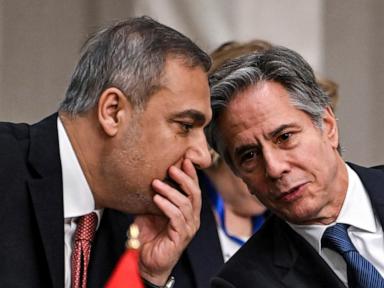Post-Assad Syria is a critical first test for the Trump Doctrine

President Bashar Assad has fallen. The man who ruled his nation with astonishing brutality for 24 years, including throughout the Arab Spring uprising and ensuing civil conflict, has been overthrown only weeks after an unexpected and rapid surge by rebel forces under the command of Abu Mohammed al-Jolani.
There is palpable jubilation among the millions of refugees who have fled Assad’s oppression over the years. Although the country’s future remains complex, there is optimism that a future is once again possible.
But the celebrations are unlikely to last for very long. Following the inauguration of President-elect Trump, the new administration will find itself under tremendous pressure to pursue a delicate diplomatic approach to the new Syria, one which will hopefully aim to avoid the rise of a new ungoverned state-sponsor of terrorism, while also keeping the U.S. at a safe distance from the quagmire.
There are many vocal critics of Trump’s isolationist tendencies. But when it comes to Syria, these instincts may prove to be advantageous.
During the recent Doha Forum in Qatar, I had the opportunity to speak with a number of policymakers from across the region. Overwhelmingly, the perception seemed to be that the Trump administration would disengage from Syria entirely, leaving a vacuum. I am less convinced.
Inasmuch as the fall of Assad presents an additional element of instability in the Middle East, it also represents an interesting opportunity for the dealmaker-in-chief to work through allies and shift the balance of power in the region away from Iran and Russia. If Trump is committed to repairing the mistakes from the Obama-era Iran nuclear deal, this could be his chance.
American policy in Syria has long struggled to balance competing priorities. Under President Barack Obama, the focus on negotiating the Iran nuclear deal led to a de-prioritization of the Syrian conflict. This created opportunities for Iran and Russia to expand their influence in Syria, further complicating the region’s dynamics. Relations with Turkey, Washington’s key NATO ally in region, have been complicated by U.S. support for YPG/SDF militants, which are directly related to the Kurdistan Workers’ Party (PKK), a designated international terrorism organization. These missteps have left a legacy of mistrust that persists today.
But competition for influence in the region is shifting, opening new opportunities. The war in Ukraine has evidently taken its toll both on Russia’s treasury and military capacity, reducing its capacity to project power in Syria. Iran, meanwhile, faces growing regional pushback against its proxy networks, including Hezbollah. Gulf states and Turkey see a chance to reshape the regional balance of power in their favor. In this environment, the United States has an opportunity to leverage these dynamics to promote stability without committing to large-scale interventions.
A potential roadmap to success in Syria should emphasize concrete steps toward a new constitution, some form of democratic representation, a transitional government, and free and fair elections within 18 months, in accordance with UN Security Council Resolution 2254.
As a multiethnic state, Syria risks exclusion and persecution of minority groups. A stable and functional Syria requires inclusive governance that addresses the needs of all its communities — including Sunni Arabs, Shia minorities and Kurdish populations. Without a political framework that reflects Syria’s diversity, the country risks fragmentation and prolonged instability. International cooperation will be essential to prevent Syria from becoming a failed state.
Turkey’s role is particularly significant. As Syria’s neighbor, it has borne the brunt of the conflict’s spillover effects. It has been hosting millions of refugees and managing cross-border security threats. Washington and Ankara must work to rebuild trust and align their priorities. This includes addressing Turkey’s concerns about Kurdish militias while ensuring that counter-ISIS efforts remain effective. A constructive U.S.-Türkiye partnership is crucial for stabilizing Syria and the broader region.
Other regional actors, including Saudi Arabia and Qatar, can play a key role working with the Trump administration and helping to finance reconstruction and supporting political reconciliation efforts. Europe, facing its own challenges with refugee flows, has a vested interest in contributing to Syria’s recovery. The U.S. should focus on coordinating these efforts, using its diplomatic leverage to align regional and international stakeholders toward common goals.
The path forward will not be easy. Syria’s complex political, ethnic and sectarian divisions make any resolution fraught with difficulty. However, the fall of Assad represents a rare opportunity to address these challenges with a renewed sense of purpose. For the U.S., this moment demands strategic engagement that prioritizes long-term stability over short-term gains. By fostering regional partnerships and supporting inclusive governance, Washington can help shape a post-Assad Syria that avoids the pitfalls of the past.
Syria’s future hinges on whether the international community can rise to the challenge. A fragmented or failed Syria would pose significant risks to the region and beyond. To prevent this outcome, all stakeholders — from Washington to Ankara to Riyadh — must work together to promote stability, security and sustainable governance.
Bilal Bilici is a member of Parliament in the Grand National Assembly of the Republic of Turkey, representing Adana in the opposition CHP party.
-

No more nation-building: Step back from post-Assad Syria
Our only absolute requirement is that the new government not support or harbor any terrorist organizations with global reach and ambitions to attack the U.S. homeland.The Hill - 3h -

Syria's Assad blames 'terrorism' for regime collapse in first statement since defeat
Former Syrian President Bashar Assad on Monday made his first official statement since being topped by a rebel offensive and fleeing the country for Russia.ABC News - 6h -
Bashar al-Assad appears to give his first account of leaving Syria.
a statement posted to the facebook account once used by president assad when he was in officeThe New York Times - 6h -

Here's what to know about the US push for stability in post-Assad Syria
Secretary of State Antony Blinken has wrapped up perhaps his last Middle East mission as America’s top diplomatABC News - 1d -
Thousands in Syria celebrate first day of prayers since Assad's regime fell
Secretary of State Antony Blinken visited Iraq on Friday to discuss the future of neighboring Syria. Meanwhile, thousands of Syrians came together in Damascus' main mosque for the first day of ...CBS News - 2d -

Fetterman calls for Trump hush money pardon in first Truth Social post
Sen. John Fetterman (D-Pa.) called for President-elect Trump to be pardoned in his New York hush money case in the senator's first Truth Social post, which he sent Tuesday. “The Trump hush money ...The Hill - 5d -
Syria's Post-Assad Vacuum Has Become a Shooting Range for Great Powers
The U.S., Turkey and Israel are all pursuing long-held ambitions in the country after Assad’s ouster weakened Iranian and Russian influence.The Wall Street Journal - 5d -

Israel Says It Destroyed Syria’s Navy, Part of Wave of Post-Assad Attacks
Israel says it is striking Syrian military sites to keep them out of “the hands of extremists.” The rebels who toppled the Assad government began laying out their plans while rival groups fought ...The New York Times - 5d -

Did Trump Drain Democrats’ Energy? These Races Will Be the First Test.
As Democrats try to fire up their fatigued base, two contests for the Virginia legislature will serve as the first measure of partisan enthusiasm since Donald J. Trump’s victory.The New York Times - Dec. 8
More from The Hill
-

TikTok asks Supreme Court to delay divest-or-ban law
The Hill - 18m -

Lawmakers signal movement toward government funding deal
The Hill - 44m -

Canadian finance minister notes Trump tariff threat in resignation letter
The Hill - 45m -

Will Trump's success spark a harder stance on immigration in Europe?
The Hill - 46m -

'FCC has no business threatening to take away broadcast licenses': Outgoing commissioner
The Hill - 47m